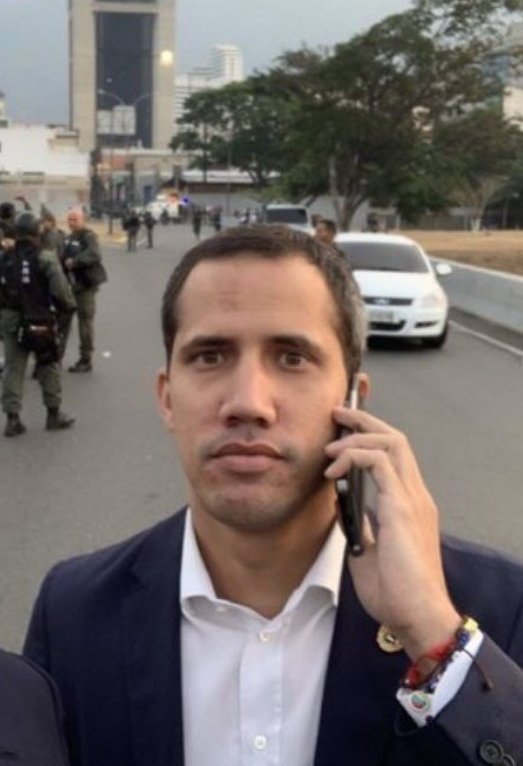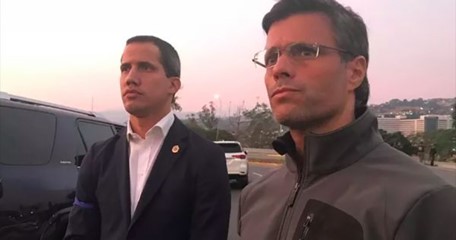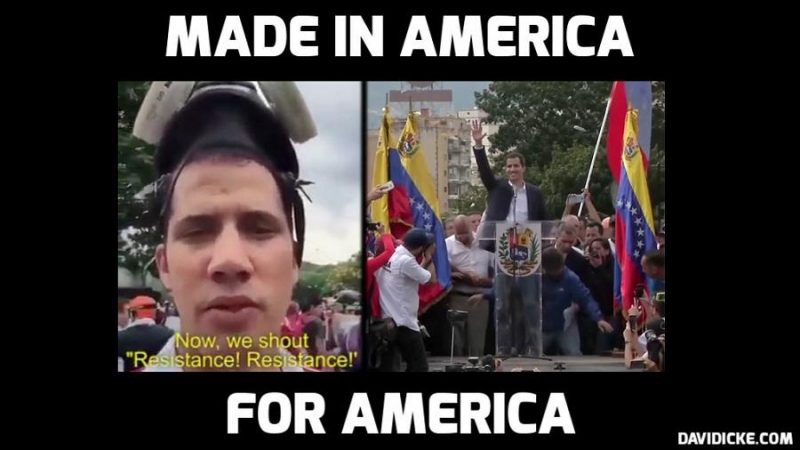
Yesterday’s failed coup attempt in Venezuela significantly hurt the Trump administration’s international standing. It delegitimized its Venezuelan clients Juan Guaidó and Leopoldo López.
After recognizing that their original ‘regime change’ plan failed (again) the White House starts to beat the war drums.
That wasn’t the plan:
The Trump administration, which has backed Mr. Guaidó since he first challenged Mr. Maduro’s authority more than three months ago, clearly thought the day would unfold differently.
There is no official explanation why the Trump administration believed that the comical coup attempt by Juan Guaidó and his master Leopolo López would work.
There are signs though that the government of President Nicolas Maduro set a trap. Several people in the top echelon of the Venezuelan government gave false promises that they would join the U.S. proxy side. They snookered Guaidó into launching his coup to let him fail.
A Washington Post wrap-up says that everyone expected important people to change sides:
The chaos in Caracas indicated that, while a plan had been in motion, it may not have unfolded as anticipated.
…
Announcements by senior Maduro officials that they were changing sides did not materialize, and the administration appeared increasingly concerned as it debated next steps.
…
Earlier Tuesday, Bolton had told reporters that Trump is watching political developments in Venezuela “minute by minute.” Bolton also put unusual public pressure on individual Venezuela government officials to renounce Maduro and embrace the political opposition.
…
“It’s a very delicate moment,” Bolton said. “The president wants to see a peaceful transfer of power,” which he added would be possible if enough military and government figures switch allegiances.
…
In an apparent attempt to divide Maduro’s government, Bolton said senior officials, including Defense Minister Vladimir Padrino López, had been in secret talks with Guaidó, and he called on them to “make good on their commitments” to help oust Maduro.
…
Bolton called by name for three officials in Venezuela — the defense minister, the chief judge of the Supreme Court, and the commander of the presidential guard — to support Guaidó taking power.
…
A senior Latin American official said opposition talks had been going on with Padrino and the other two for “the last several weeks,”and that the three had been promised retention in their current positions if they came out publicly in support of “constitutional order” that would allow Guaidó to take power. The official, who spoke on the condition of anonymity about the fast-moving and confusing situation, said those involved in the negotiations had no initial explanation for what went wrong, …
…
Elliott Abrams, the administration’s special envoy for Venezuela, told reporters Tuesday that the United States had expected Padrino, along with the head of the Maduro-appointed Supreme Court and the head of the national guard, to declare their support for the Venezuelan constitution, if not necessarily for Guaidó himself.
…
He said that opposition figures had held discussions with the three influential officials in Maduro’s government ahead of those planned demonstrations.
…
Carlos Vecchio, Guaidó’s ambassador to the United States, also said Monday that the opposition leadership had had “conversations with part of the inner circle of Maduro” and that “they know that Maduro is not going anywhere. That Maduro is the past . . . and that’s why they want to look for a different future for Venezuela.”
Everyone in Washington believed that significant figures in the Venezuelan government would change sides. They did not do so.
Vladimir Padrino rejected the coup within an hour after Guaidó announced it. It seems that the Guaidó side got played by the Venezuelan Defense Minister and several other officials and officers.
They seem to have promised to support Guaidó only to bait him into taking steps that would embarrass him.
A McClatchy piece headlined “What went wrong?” seems to confirm this interpretation:
Shortly after Guaidó gave his predawn speech at the Carlota Air Force Base in Caracas, rumors spread that Armed Forces Chief of Staff Jose Ornelias and powerful commander Jesús Suárez Chourio were behind the military uprising. But just as quickly both men joined a growing list of officials swearing loyalty to Maduro.
…
That military officials who owe their careers and livelihood to Maduro and the United Socialist Party of Venezuela didn’t abandon him shouldn’t have come as a surprise, said a former U.S. diplomat in Washington, who would only talk on background.
He said he’d known about Guaidós plans to call for an uprising for at least 10 days.
“If I knew it, then everyone knew it,” he said. “The [Maduro] regime saw it coming and was prepared. The regime probably even knew that people in the government were talking to the opposition and probably even approved of it.”
The total failure of the coup is obvious when one looks at what happened to Leopoldo López, the mentor of Juan Guaidó. He was under house arrest for leading the violent demonstrations and deadly riots in 2014. Yesterday morning the guards let him go.
While the circumstances are not clear, the police chief responsible for the guards has been fired. López promised his followers that he would go to the Miraflores Presidential Palace. But he wasn’t even able to leave eastern Caracas.
Yesterday evening López, with his wife and daughter, fled into the Chilean embassy. They seem to have disliked the accommodations. Two hours later they moved into the Spanish embassy.
While the embassy food may be good, it will be a quite different life than in their own comfortable mansion. A few of the soldiers who supported Guaidó took refuge in the Brazilian embassy. Guaidó is still free.
McClatchy also looked at the consequences of the failing coup:
” .. Guaidó’s move is also a highly precarious bet,” [Risa Grais-Targow, an analyst with the Eurasia Group,] wrote. “If Maduro can successfully put down the rebellion, it will be a strong signal that he still enjoys a high degree of military support, which in turn will probably deflate the opposition.”
…
Guaidó took a risk announcing the military support, [Venezuela security expert Brian Fonseca, a former Marine and U.S. Southern Command intelligence analyst who now serves as the director of the Jack D. Gordon Institute for Public Policy at Florida International University] said, and if the Army does not back him, it could be crippling. “If today’s movement falls flat — what does that mean for credibility of the Guaidó movement?”
Guaidó and his backers in the Trump administration were made to believe that some significant elements of the Maduro government and of the army would turn on Maduro. They launched a coup attempt that fell apart within a few hours as no one changed sides.
All their blustering has now been deflated. Guaidó has lost his credibility. Washington may still support him but in Caracas there is likely no one left who believes in him.
Bolton, Pompeo, Abrams and of course Donald Trump have been exposed as buffoons who, despite their powerful positions, can not even organize a simple coup. They publicly supported through dozens of tweets and interviews what turned out be a bad amateur theater play. The diplomatic corps will joke about this episode for the next decade.
As the Saker remarks:
The Empire only appears to be strong. In reality it is weak, confused, clueless and, most importantly, run by a sad gang of incompetent thugs who think that they can scare everybody into submission in spite of not having won a single significant war since 1945. The inability to break the will of the people of Venezuela is only the latest symptom of this mind-boggling weakness.
When it became obvious that the coup attempt failed, the White House started to blame others. It claimed that Russia dissuaded Maduro from fleeing the country.
It said that Cuba, which has 20,000 doctors but no soldiers in Venezuela, controlled the Venezuelan military and prevented its uprising. It is now starting to beat the war drums.

Having lost face the Trump administration today upped its rhetoric:
Washington is open for “military action” in dealing with Venezuela’s crisis, Secretary of State Mike Pompeo announced. Softening his war-mongering rhetoric, he said that a peaceful option is still more preferable.
“If the question is, is the United States prepared to consider military action if that’s what it takes to restore the democracy there in Venezuela, the [US] president’s been consistent and unambiguous about that, that the option to use military force is available if that’s what is ultimately called for,” Pompeo said in an interview on Fox News.
The Trump administration also launched what can be considered to be psychological warfare:
The U.S. Federal Aviation Administration (FAA) on Tuesday evening issued an order prohibiting U.S. air operators from flying below 26,000 feet in Venezuela’s airspace until further notice, citing “increasing political instability and tensions”.
The FAA notice said any air operators currently in Venezuela, which would include private jets, should depart within 48 hours.
…
American Airlines Group Inc in March said it was indefinitely suspending its flights to Venezuela, as the country continued to struggle with political turmoil and unrest.
Several other airlines also canceled their flights:
Spanish airline Air Europa says Wednesday’s Caracas flights have been canceled. Flights over the next 10 days also might also be affected because of the “latest developments” in Venezuela.
The Caracas-based travel agency Molina Viajes says flights to and from Miami on Wednesday have been suspended.
Estelar airline says its Wednesday flight from Buenos Aires, Argentina, to Caracas has been cancelled. However, it says flights to and from Peru and Chile are operating.
Such FAA orders are only given for countries where an active air war is going on and where air-defense weapons are expected to be fired. For now no one believes that the U.S. will launch cruise missiles or make bombing runs on Venezuela. It would be in no way justified.
Then again – what might it do should a ‘massacre’ happen in Venezuela. If hundreds of Guaidó supporters get mowed down by machine gun wielding troops in a false flag operation, the U.S. would surely accuse the Maduro government.
With the U.S. media and the Democratic Party fully aligned with the White House regime change strategy there would be little resistance to the use of force.
A ‘humanitarian’ bombing run against Venezuelan government targets, primarily its air defenses, might then be considered to be the right response.
Here is another ominous sign (Spanish, machine translated) that something is up:
The acting Secretary of Defense of the USA, Patrick Shanahan, canceled a trip to Europe that was due to begin this Wednesday, May 1, in order to “coordinate more efficiently” with other branches of the Government, both the situation in Venezuela and the Army’s mission in the border with Mexico.
“Secretary Shanahan will no longer travel to Europe, as he has decided that staying in Washington DC will allow him to coordinate more efficiently with the White House National Security Council (NSC) and the State Department the situation in Venezuela.”, the Pentagon said in a statement.
…
During his tour of Europe, Shanahan had planned to travel to Germany, Belgium and the United Kingdom.
Another sign that something is up is a phone call (Russian, machine translated) today between the Foreign Minister of Russia Sergej Lavrov and Secretary of State Mike Pompeo:
On May 1, on the American initiative, a telephone conversation took place between the Minister of Foreign Affairs of the Russian Federation, Sergey Lavrov, and the US Secretary of State, M. Pompeo.
The focus was on the situation in Venezuela, where on the eve of the opposition, with the clear support of the United States, attempted to seize power. It was stressed on the Russian side that Washington’s interference in the internal affairs of a sovereign state, the threat against its leadership is a gross violation of international law.
It is indicated that the continuation of aggressive steps is fraught with the most serious consequences.
Only the Venezuelan people have the right to determine their destiny, for which the dialogue of all political forces in the country is demanded, for which its Government has long called for.
A destructive external influence, especially a forceful one, has nothing to do with the democratic process.
The generals in the Pentagon will not like the rhetorical build-up at all. They will look at their maps and find that Venezuela is twice the size of Iraq and 30% larger than Afghanistan.

It has impenetrable jungles, mountains and slums that even Venezuelan troops do not dare to enter. It has a functioning army and halfway decent air defenses which were recently upgraded by Russian specialists.
It is unlikely that Trump wants to launch a war on Venezuela. He likely knows that it would not be a cake walk, and that it would be a severe risk for his reelection.
But who knows what Bolton or Pompeo might tell him to get their way. They just got snookered by the Maduro government. Why would they not snooker Trump?
This article was originally published by “Moon Of Alabama“.
The 21st Century
